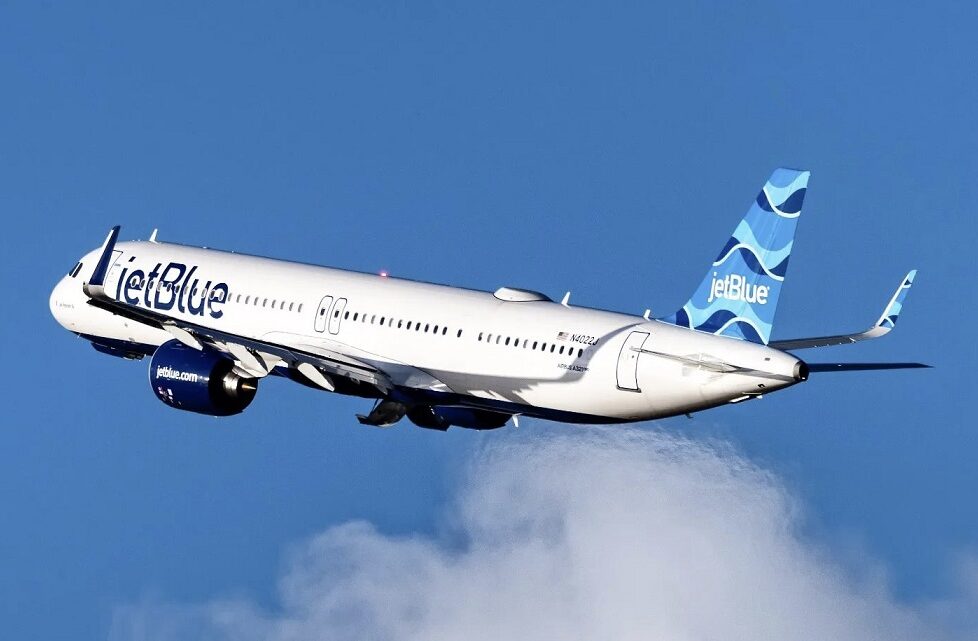JetBlue to Slash Per-Seat Emissions in Half by 2035

JetBlue announced a new commitment to reduce lifecycle emissions related to jet fuel by 50% per revenue tonne kilometer (RTK) by 2035, and provided a detailed outline of its plan to achieve net zero emissions by 2040, with a significant focus on low carbon solutions.
JetBlue CEO Robin Hayes said that cutting emissions on half on a per-seat basis “will require substantial change to the way we run our business today.” The company said that it will increase investments in lower-carbon solutions and evaluate future sustainability investments with the target in mind in order to reach its new goal.
Described by the company as its most aggressive near-term emissions reduction target to-date, JetBlue said that the new 2035 goal has been approved by the Science Based Targets initiative (SBTi), and aligns with its 2040 net zero pledge, initially announced last year.
The company also released the JetBlue Projected Emissions Reduction Pathway, detailing its roadmap to the achievement of its 2035 and 2040 targets. The guidance indicates that transitioning to sustainable aviation fuels (SAF) is expected to be the key contributor to the JetBlue’s decarbonization strategy, representing over half of its emissions reductions relative to a business-as-usual pathway. JetBlue has stated that it sees SAF as the most promising avenue to rapidly address aviation emissions, and is on track to hit its goal to convert 10% of the airline’s total fuel to be SAF by 2030. JetBlue has recently announced several of SAF-sourcing deals with suppliers including Fidelis New Energy, AIR Company, and Neste.
Additional key components of the company’s emissions reduction strategy include advancements in aircraft technology and fuel efficiency, including the transition to newer and more advanced aircraft, as well as the potential for broader efficiency improvements for next generation aircraft yet to be developed, and advocating for initiatives such as air traffic control modernization.
The strategy also includes the use of investments in high-quality carbon removals and offsets, although JetBlue stated that it will prioritize low carbon solutions, with the roadmap allocating only 5% of projected reductions to carbon removals and offsets. JetBlue said that it has chosen to discontinue its voluntary carbon offsetting of domestic flights into 2023, reallocating offset spending into operational investments to reduce emissions, and that it will “evolve its offsetting strategy to support a curated list of primarily nature-based projects in and around the destinations the airline serves.”
JetBlue noted that its strategy and ability to hit its targets will rely on support from industry and policymakers, with the plan assuming that SAF becomes cost-competitive with conventional jet fuel, and that OEMs continue to advance technology improvements such as new engine and fleet designs.
Sara Bogdan, Director of Sustainability and EnvironmentalEnvironmental criteria consider how a company performs as a steward of nature. More SocialSocial criteria examine how it manages relationships with employees, suppliers, customers, and the communities where it operates. More GovernanceGovernance deals with a company’s leadership, executive pay, audits, internal controls, and shareholder rights. More at JetBlue, said:
“The aviation industry is at a critical time in our push towards net zero. Many of these lower carbon solutions are proven, but still haven’t achieved the scale needed to make a meaningful impact. Encouragement of these maturing technologies is needed and the investments we make today will help shape the trajectory of these solutions as they grow to realize their fullest potential.”
The post JetBlue to Slash Per-Seat Emissions in Half by 2035 appeared first on ESG Today.